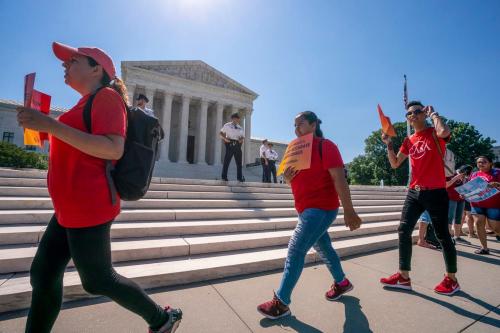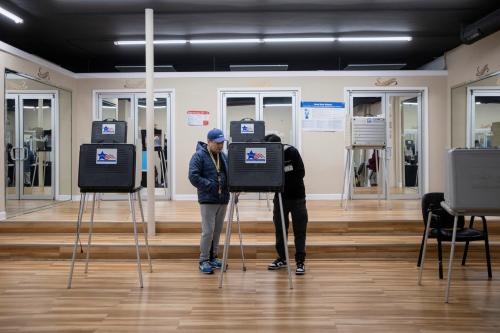The 4th of July brings welcome news for all who look to a fair and accurate U.S. census as a pillar of our representative government. Despite last week’s Supreme Court’s decision to push the “citizenship question” issue down to lower courts for further ruling and President Trump’s initial insistence that he would fight to keep it on the 2020 census, the administration has now relented. Census forms are now being printed without the question which would have led to a flawed and politically fraught census. So who wins?
The contentious, late in the game effort by the Trump administration to place this question on the 2020 census was based on what the Supreme Court stated as a “contrived” rationale: to better enforce the 1965 Voting Rights Act which stipulates that citizens of different racial groups be considered in the drawing of legislative districts. The rationale was hotly contested by civil rights groups, professional associations, and a plurality of state attorneys general who attributed it to more nefarious motivations—to undercount immigrant minorities and to alter redistricting for the political advantage of Republicans. Though the court left the door open for a more adequate explanation, the administration apparently felt it could not prevail in continued litigation and, perhaps more importantly, that it would not be possible to delay the printing of over one billion forms needed to conduct the census, mandated to occur next April.
Clear winners in this outcome are cities and neighborhoods with large numbers of households that contain foreign born, noncitizen populations.
Clear winners in this outcome are cities and neighborhoods with large numbers of households that contain foreign born, noncitizen populations. This would be an estimated nine million persons, including large numbers of Hispanic and Asian residents, many of whom would have been intimidated from filling out the census, due to fear of having information shared with law enforcement or being subject to other forms of harassment in the current political environment. These groups are among the nation’s most youthful, fastest growing populations and heavily located in urban areas—including metropolitan areas like Miami, Los Angeles, and Houston.
Their underenumeration would have robbed these communities of their fair shares of an estimated $900 billion in government assistance that is allocated according to census counts, including funds for housing assistance, job training, community development and social services.
Also winning are high immigration states that stood to lose seats in Congress that they would otherwise hold on to. The constitutionally mandated purpose for conducting the census is to reapportion Congress and, by extension, the Electoral College. If the citizenship question were included on the 2020 Census, California almost certainly would have lost a seat according to several studies. Other potential losers would be New York, as well as some of the nation’s fastest growing states, such as Texas, Arizona and Florida.
Perhaps the biggest gain for preserving a democratic representative government is the ability to maintain a fair redistricting of legislative districts within states.
Perhaps the biggest gain for preserving a democratic representative government is the ability to maintain a fair redistricting of legislative districts within states. The census is used to create congressional districts as well as those for state senates and legislatures in order to reflect local representation with similar sized populations. At risk with a flawed census that selectively underenumerates specific groups—immigrants, racial minorities, and urban residents—is that these groups would count less in decisionmaking regarding state and federal laws.
An even more dangerous outcome along these lines would have been if the availability of citizenship information for all individuals would have tempted state legislatures to use the citizen voting aged population rather than the total population to draw these districts. The elimination of children, let alone noncitizens, would clearly make these districts appear whiter, older and more rural than that of the total populations that should be represented. Already the under age 15 child population in the U.S. is less than half white, compared with 60.4% for the total population and 68% for the citizen voting aged population. These disparities are even greater in diverse states such as Texas and Arizona. Such redistricting would vastly underrepresent the nation’s increasingly diverse child population.
While the citizen population is not currently used for this purpose and is subject to further court ruling, this has been proposed by Republican redistricting strategists. Indeed, a Maryland district court has been looking into the case, inquiring whether this is the kind of redistricting that prompted the Trump administration’s interest in the citizenship question, based on uncovered documents by deceased Republican redistricting strategist Thomas Hofeller, whose communications with the administration suggested that this kind of redistricting would be advantageous to “Republicans and Non-Hispanic Whites.”
Other big winners from the omission of the citizenship question on the 2020 census are public and private sector decisionmakers who rely on accurate surveys that will be taken over the entire next decade and are based on the census sampling frame. These data inform decisions of where to locate hospitals, parks, schools, employment sites, housing construction, job locations and retail establishments. A flawed census would have deprived underenumerated groups with access to services and provide businesses with skewed information about potential customers and workers.
Perhaps the biggest gain from this outcome will be the reestablishment of the census as a civic engagement exercise that is part of our democracy. It allows the nation’s residents to proclaim that they are part of this great nation, and by virtue of the Constitution, ensures that they will be fairly represented in Congress. While the omission of the citizenship question may not prevent future attempts by the Trump administration and others to politicize the census and discourage some to participate, we can count on the groups who successfully fought the citizenship question to promote widespread participation in the census in communities across the country. All in all, the nation is the winner. It’s a great outcome to have this 4th of July.







Commentary
The citizenship question is off the census. Who wins?
July 3, 2019